
Earlier this year, the
world was shocked by the news of celebrity chef Anthony Bourdain’s suicide. CNN
wrote about Bourdain’s legacy, “His love of great adventure, new friends, fine
food and drink and the remarkable stories of the world made him a unique
storyteller.”[1]
Bourdain’s death came at a
time when the suicide trend is on the uptick. According to the CDC a 2018 survey
showed suicide rates increased by 25% across the United States over nearly two
decades ending in 2016. Twenty-five states experienced a rise in suicides by
more than 30%.[2]
This is jarring especially
when you consider that Bourdain had the job so many of us dream about—traveling
around the globe, trying the most usual cuisines and engaging in conversations
with people from every walk of life, and a very successful TV program.

You can’t help but wonder,
how could someone who has experienced every wonder of the world, still want to
take their own life? Doesn’t traveling the globe open up a treasure trove of
insight and understanding? Perhaps, but it also could reveal that there is
nothing there once you get “there.” Bourdain was once quoted as saying, “Your
body is not a temple, it’s an amusement park. Enjoy the ride.” That’s the
philosophy of hedonism in a nutshell—if it feels good do it! Sadly, Bourdain
proved the old adage, “the best cure for hedonism is an attempt to practice
it.”
Anthony Bourdain searched
the world high and low, and still found nothing that could truly satisfy him.
If only he would have read the diary of King Solomon he could have saved
himself a lot of heartache. Solomon was the original playboy. He had all the
brains and all the bucks a man could want. He had it all and tried it all, and
after his pursuit of pleasure he concluded:
“10 Whatever my eyes
desired I did not keep from them. I did not withhold my heart from any
pleasure, for my heart rejoiced in all my labor; and this was my reward from
all my labor.
11 Then I looked on all
the works that my hands had done and on the labor in which I had toiled; and
indeed all was vanity and grasping for the wind. There was no profit under the
sun.” (Ecclesiastes 2:10-11).
Solomon’s raw and honest appraisal
of life “under the sun” reveals a couple of timeless principles. First, sensual pleasures hold out promises that
lack staying power. The curse of
pleasure is that it is fleeting, like trying to hold on to sand—the harder you
grasp the more it slips out through our fingers. Second, hedonism mistakes your body to be your soul and earth for heaven. The
human soul has a bottomless capacity for happiness. Not only that, but the human soul is immaterial.
Trying to fill a soul with finite things like money and possessions is futile—that’s
like trying to fill up a colander with water. Because your soul is not made of
matter then no material thing will be able to please it. In the end, what we
need is an infinite Being who does not change in His ability to give meaning and
fulfillment. The only Being big enough to fill the human soul is Christ who
promised abundant life in the here and hereafter (John 10:10).
C.S. Lewis insightfully
said in Mere Christianity: “God
designed the human machine to run on Himself. He Himself is the fuel our
spirits were designed to burn, or the food our spirits were designed to feed
on. There is no other. That is why it is just no good asking God to make us
happy in our own way without bothering about faith. God cannot give us a
happiness and peace apart from Himself, because it is not there. There is no
such thing.”[3] -DM
[1] Brian
Stelter, “CNN's Anthony Bourdain Dead at 61,” CNN, 8 June 2018 <https://www.cnn.com/2018/06/08/ us/anthony-bourdain-obit/index.html>
[2] “Suicide
Rates Rising Across the U.S.” CDC, 7
June 2018 <https://www.cdc.gov/media/releases/2018/p0607-suicide-prevention.html>
[3]
C.S. Lewis, Mere Christianity (San
Francisco: Harper One, 1952), 50.
No comments:
Post a Comment